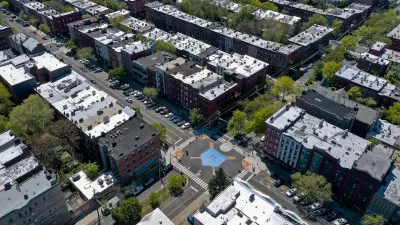Toronto has gone back to the drawing board for more effective strategies and tactics for reducing traffic fatalities after its first attempt failed to produce any measurable results.
"City council has voted to reboot its road-safety plan, as its first attempt failed to reduce traffic deaths," reports Ben Spurr from Toronto.
"Three years after endorsing the city’s first Vision Zero strategy aimed at eliminating road fatalities, councillors voted unanimously Tuesday to adopt Vision Zero 2.0," according to Spurr.
"Under the enhanced plan, the city will reduce speed limits on dozens of arterial roads across Toronto, install more sidewalks and implement more pedestrian head-start signals, among other measures."
In the year following the implementation of the previous version of the plan, pedestrian and cyclist fatalities actually jumped, from 45 to 47.
FULL STORY: ‘You hesitate, you lose lives’: Toronto votes for more aggressive Vision Zero road safety plan

Planetizen Federal Action Tracker
A weekly monitor of how Trump’s orders and actions are impacting planners and planning in America.

Maui's Vacation Rental Debate Turns Ugly
Verbal attacks, misinformation campaigns and fistfights plague a high-stakes debate to convert thousands of vacation rentals into long-term housing.

Restaurant Patios Were a Pandemic Win — Why Were They so Hard to Keep?
Social distancing requirements and changes in travel patterns prompted cities to pilot new uses for street and sidewalk space. Then it got complicated.

In California Battle of Housing vs. Environment, Housing Just Won
A new state law significantly limits the power of CEQA, an environmental review law that served as a powerful tool for blocking new development.

Boulder Eliminates Parking Minimums Citywide
Officials estimate the cost of building a single underground parking space at up to $100,000.

Orange County, Florida Adopts Largest US “Sprawl Repair” Code
The ‘Orange Code’ seeks to rectify decades of sprawl-inducing, car-oriented development.
Urban Design for Planners 1: Software Tools
This six-course series explores essential urban design concepts using open source software and equips planners with the tools they need to participate fully in the urban design process.
Planning for Universal Design
Learn the tools for implementing Universal Design in planning regulations.
Heyer Gruel & Associates PA
JM Goldson LLC
Custer County Colorado
City of Camden Redevelopment Agency
City of Astoria
Transportation Research & Education Center (TREC) at Portland State University
Jefferson Parish Government
Camden Redevelopment Agency
City of Claremont





























